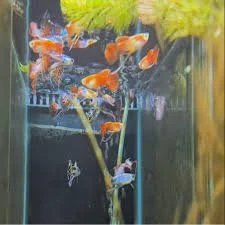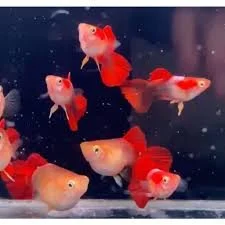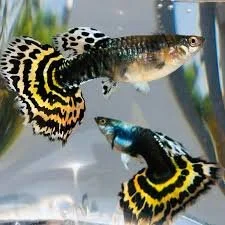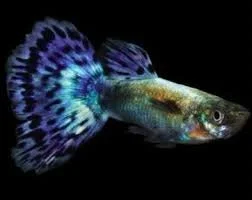 Image 1 of 1
Image 1 of 1


Guppy- Moscow Blue
Guppies (Poecilia reticulata) are one of the most popular and colorful freshwater fish species in the aquarium hobby. They are known for their vibrant colors, lively personalities, and ease of care. Here's some detailed information on caring for guppies:
Tank Setup:
Guppies are small fish, so they can thrive in relatively small aquariums. A tank size of at least 10 gallons (38 liters) is suitable for a small group of guppies.
Provide plenty of plants, both real and artificial, as well as hiding spots and decorations. Guppies enjoy exploring their environment and having places to retreat to.
Water Parameters:
Guppies are adaptable to a wide range of water parameters, but they prefer slightly alkaline to neutral water with a pH between 6.8 and 7.8.
Maintain a water temperature between 75-82°F (24-28°C).
Regular water changes are essential to keep the water clean and maintain good water quality.
Tank Mates:
Guppies are peaceful fish and can be kept with a variety of other peaceful community fish.
Avoid keeping them with aggressive or fin-nipping species that may harass them, such as some species of barbs or cichlids.
Suitable tankmates include other small fish like tetras, rasboras, mollies, platies, and peaceful bottom dwellers like Corydoras catfish.
Diet:
Guppies are omnivores and will eat a variety of foods.
Offer them a balanced diet consisting of high-quality flake or pellet food as their staple diet.
Supplement their diet with occasional live or frozen foods like bloodworms, brine shrimp, or daphnia to provide them with additional nutrition and variety.
Breeding:
Guppies are prolific breeders and can breed easily in the home aquarium.
If you have both male and female guppies in the same tank, expect them to breed unless you want to control the population.
Provide plenty of plants or hiding spots for the fry to hide in after birth, as adult guppies may eat their own young.
Health:
Guppies are generally hardy fish but can be susceptible to common aquarium diseases like ich (white spot disease), fin rot, and fungal infections.
Maintain good water quality, avoid overcrowding, and provide a balanced diet to help prevent diseases.
Quarantine new fish before introducing them to your main tank to prevent the spread of diseases.
Tank Maintenance:
Regular maintenance is essential to keep your guppy tank healthy.
Perform weekly water changes of around 20-30% to remove waste and maintain water quality.
Clean the substrate, filter, and decorations periodically to prevent the buildup of debris and algae.
By providing a suitable environment, good nutrition, and proper care, guppies can thrive and bring color and activity to your freshwater aquarium.
Guppies (Poecilia reticulata) are one of the most popular and colorful freshwater fish species in the aquarium hobby. They are known for their vibrant colors, lively personalities, and ease of care. Here's some detailed information on caring for guppies:
Tank Setup:
Guppies are small fish, so they can thrive in relatively small aquariums. A tank size of at least 10 gallons (38 liters) is suitable for a small group of guppies.
Provide plenty of plants, both real and artificial, as well as hiding spots and decorations. Guppies enjoy exploring their environment and having places to retreat to.
Water Parameters:
Guppies are adaptable to a wide range of water parameters, but they prefer slightly alkaline to neutral water with a pH between 6.8 and 7.8.
Maintain a water temperature between 75-82°F (24-28°C).
Regular water changes are essential to keep the water clean and maintain good water quality.
Tank Mates:
Guppies are peaceful fish and can be kept with a variety of other peaceful community fish.
Avoid keeping them with aggressive or fin-nipping species that may harass them, such as some species of barbs or cichlids.
Suitable tankmates include other small fish like tetras, rasboras, mollies, platies, and peaceful bottom dwellers like Corydoras catfish.
Diet:
Guppies are omnivores and will eat a variety of foods.
Offer them a balanced diet consisting of high-quality flake or pellet food as their staple diet.
Supplement their diet with occasional live or frozen foods like bloodworms, brine shrimp, or daphnia to provide them with additional nutrition and variety.
Breeding:
Guppies are prolific breeders and can breed easily in the home aquarium.
If you have both male and female guppies in the same tank, expect them to breed unless you want to control the population.
Provide plenty of plants or hiding spots for the fry to hide in after birth, as adult guppies may eat their own young.
Health:
Guppies are generally hardy fish but can be susceptible to common aquarium diseases like ich (white spot disease), fin rot, and fungal infections.
Maintain good water quality, avoid overcrowding, and provide a balanced diet to help prevent diseases.
Quarantine new fish before introducing them to your main tank to prevent the spread of diseases.
Tank Maintenance:
Regular maintenance is essential to keep your guppy tank healthy.
Perform weekly water changes of around 20-30% to remove waste and maintain water quality.
Clean the substrate, filter, and decorations periodically to prevent the buildup of debris and algae.
By providing a suitable environment, good nutrition, and proper care, guppies can thrive and bring color and activity to your freshwater aquarium.






